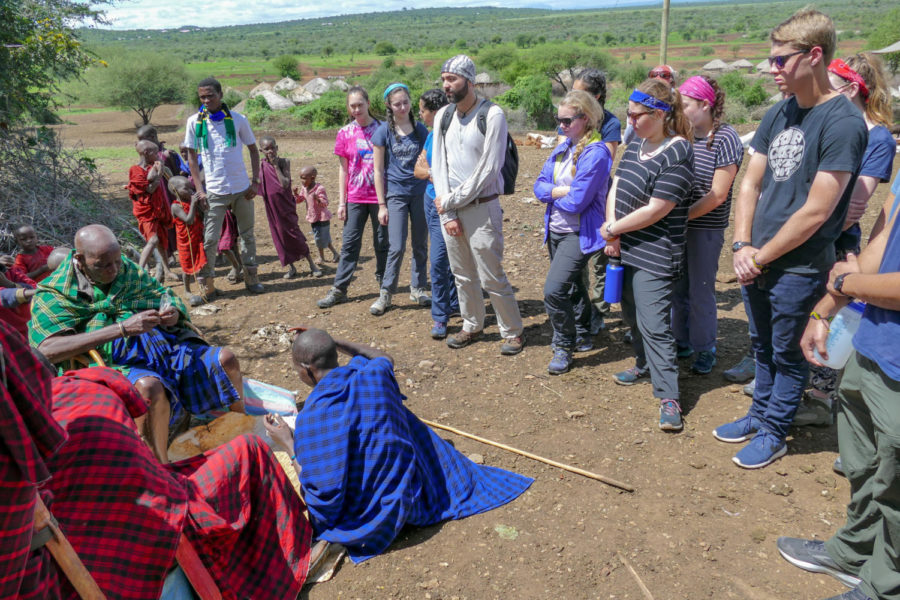Borderlands Trips Will Allow Menlo Students To Learn Outside of the Classroom
During the summer of 2019, students had the opportunity to live, work and go to school in Tanzania through the Menlo Abroad program. Photo courtesy of Pete Zivkov.
February 28, 2022
In place of the Menlo Abroad program, which was canceled in 2020 due to COVID-19, Menlo created a new program that will be occurring during M-term this year: the Borderlands trips. The program features trips to El Paso, Tex. and Northern and Southern Arizona. Each trip will focus on a different topic and will take place from May 23 to June 3.
Global Programs Director Peter Brown has four goals for what students should take away from their trips. “[Students should] deepen their knowledge of both themselves and the people and places they’re visiting,” Brown said. The second goal of the program strives for students to deepen their sense of empathy and connection with other groups of people. “Number three is a sense of relatedness,” Brown said. “And then the fourth is to bring the lessons back home,” Brown said.
The deadline for applications to go on the trip was Jan. 25. “There [were] 110 applications and only 48 slots, so it’s very difficult this year,” Brown said.
The focus of the El Paso trip is to learn about immigration at the U.S.-Mexico border. “They’ll be listening to people from different perspectives, border patrol, customs [and] the Immigration and Naturalization Service. They’ll be speaking with immigrants, people who have come across the border, and they’ll be speaking with those in the sanctuary movement, the people who are supportive of those who come across from the south,” Brown said.
According to Brown, there have been a lot of church groups that make up the sanctuary movement that have been supporting and aiding immigrants. The group will also be taking a break from learning about immigration to visit White Sands National Park.
Another group of students will be going to Northern Arizona to learn about the Navajo people. The group will be crossing the boundary into the Navajo Nation to learn more about how the Navajo live. “They’ll be living in traditional ways, for instance, learning to cook the way the Navajo do or tanning sheepskins,” Brown said.
During the trip to Southern Arizona, students will learn about sustainability. “[The group will be] studying how people have survived in the Sonoran desert environment,” Brown said. It will intersect with some of the topics from the other trips, like studying Indigenous Americans’ culture. The trip will also include visiting straw bale houses and learning how the proximity of the U.S.-Mexico border affects the area.
Junior Tabitha Corcoran applied to go on the Borderlands trip and was selected. She was originally going to go on Menlo Abroad earlier. “I was actually supposed to go to Menlo Abroad Guatemala in [my] freshman year, but it sadly got canceled, so this is another chance for me to get out of [my] comfort zone,” Corcoran said.
Corcoran said she was interested in going on the trip because she’s been interested in sustainability. “I was placed in the Southern Arizona trip with the leaders Aubrey Fennel and Justin Carunchia, which was my first choice,” Corcoran said. She also preferred the Southern Arizona trip for a few other reasons. “I chose this trip because I am close to both of the leaders and want to be able to explore the towns around Southern Arizona,” Corcoran said.
History teacher Matthew Nelson is chaperoning the Borderlands trip to El Paso this year. Nelson was originally going to chaperone Menlo Abroad’s trip to Senegal in 2020, which was canceled due to COVID-19. He has also chaperoned Menlo Abroad’s trips to India. “If I can’t go overseas, I would teach [in] a place that is a cross-culture experience for students, even if it is in the U.S. Most students don’t know what it is like being a new immigrant and being in the U.S,” Nelson said. Nelson also touched on his expectations for the trip. “I hope our experiences in El Paso will deepen our awareness of and our responsibility to the immigrants that come to the U.S. I hope it deeply humanizes the experience of undocumented immigrants,” Nelson said.



